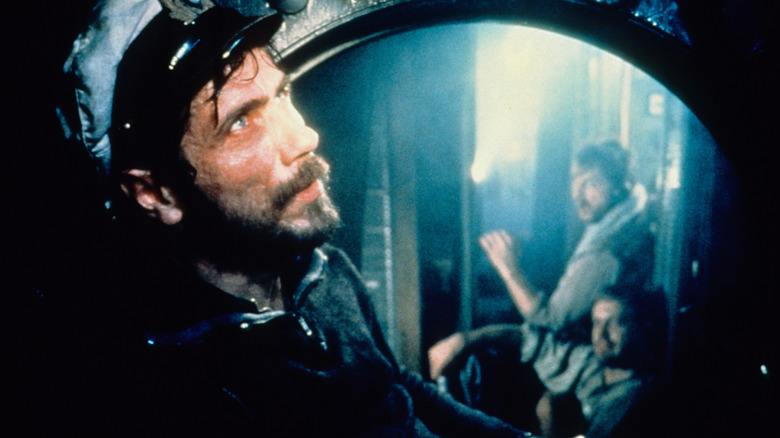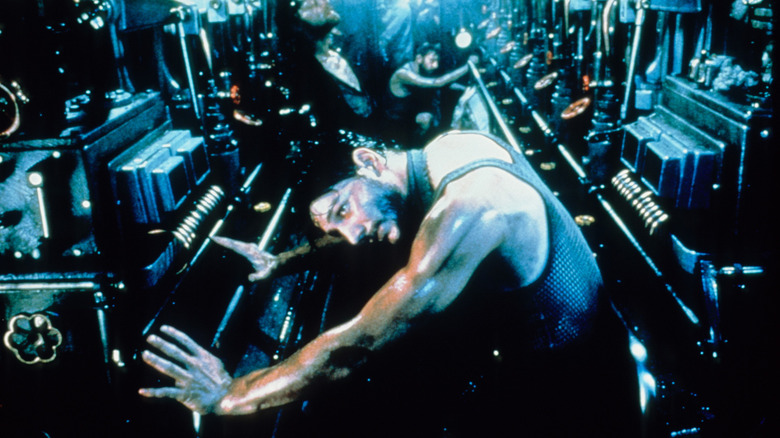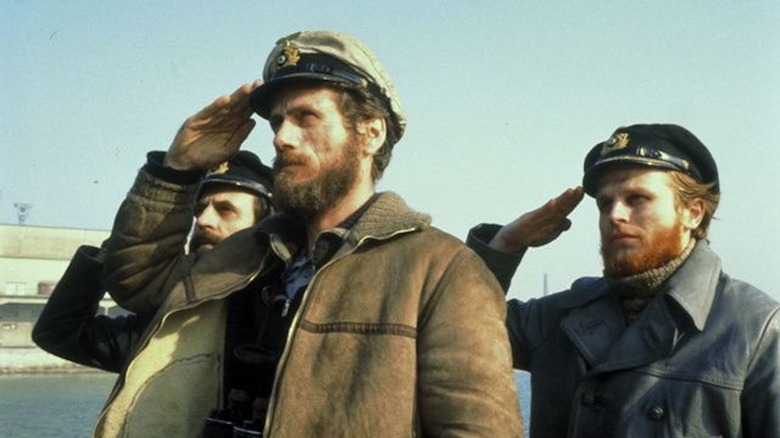With Das Boot, Wolfgang Petersen Directed The Single Greatest Submarine Movie Ever Made
Submarine films were a cliché-ridden subgenre when Wolfgang Petersen's "Das Boot" surfaced in 1981 and shattered our conventional notions of what it's like to serve during wartime in a tin can beneath the surface of the ocean. It is, in short, a sweaty, stinky hell. Films like "On the Beach," "The Enemy Below" and "Run Silent, Run Deep" envisaged a spacious, camera-accommodating environment where the characters had to give voice to their characters' cooped-up anxiety. In general, life on a submarine seemed like a rare adventure. The post-apocalyptic bleakness of "On the Beach" aside, these might as well have been recruiting films.
"Das Boot" plunges us into a cramped, frantic environment where the crew scramble through tight quarters like the occupants of an ant farm. Every sailor serves a purpose, and they observe an absurd, yet necessary chain of command as they bustle past one another. Even though this is World War II, and these are German soldiers, Petersen makes it clear that the ship's captain (a steely-eyed Jürgen Prochnow) and much of the crew are no fans of the Nazi regime. They have been assigned a mission, and they work in tandem with each other, for each other. Survival is their objective, and the only way to stay alive is to perform their maddeningly precise duties to the best of their abilities. Only then might they avoid the depth charges that would consign them to a deep, briny grave.
Trapped in the belly of a submerged beast
I first watched "Das Boot" in its 149-minute theatrical form when I was 10 years old. Though I was an unusually curious film buff at that age, I was not in the habit of slugging it out through two-and-a-half-hour movies, especially when they were subtitled. But once the U-boat set to sea, I was in for the long haul. There was a fascinating, Richard Scarry specificity to the inner workings of the vessel. Petersen eschewed momentum-killing exposition, and simply presented these men and their martial habitat for what it was, which was both exhilarating and terrifying. The basics are conveyed to the journalist/audience surrogate (Herbert Grönemeyer) charged with documenting the crew's operation, but Petersen, aided immensely by the hurtling camera of cinematographer Jost Vacano, deftly and wordlessly establishes the geography of the submarine. If there's a hitch in the system, you sense it visually.
There is also the esprit de corps of the sailors, who are given to celebratory sing-a-longs of "It's a Long Way to Tipperary," a song favored by British soldiers during World War I. It's a cheeky appropriation, and it endears us to these men despite the essential awfulness of their mission. This is the genius of Petersen's movie: even in the extended 207-minute cut of the film (which I saw theatrically at Manhattan's Loews Lincoln Square theater with a handful of hookey-playing cinephiles on a blustery weekday afternoon in April 1997), you shut out the reason they're fighting. Because we've been fully thrust into the peril of their situation, we hope like hell they'll get their crippled sub off the floor of the ocean.
An unsinkable classic
Moment to moment, "Das Boot" slaps you in a vise grip, and, save for a few above-water vignettes (including the devastating finale), squeezes you silly. It is a film of single-minded purpose executed with stunning fidelity, and Petersen never made another movie like it! His "Die Hard" riff, "Air Force One," is disappointingly slack (when it's not being marred by subpar CG), while "The Perfect Storm" is so soundstage-bound you never feel a sustained sense of danger.
Post-"Das Boot", Petersen was at his best crafting crowd-pleasers that engaged his remarkably versatile skillset, particularly psychological thrillers like "Shattered" and the masterful "In the Line of Fire" (which features one of Clint Eastwood's finest performances). Critics often wondered why Petersen never went back to the "Das Boot" well, but that's like asking Sir Edmund Hilary to climb Mount Everest again, only faster. Had Petersen retired after "Das Boot," we'd be referring to him in the reverent tones reserved for a one-and-done phenomenon like Charles Laughton. He might've never matched his masterpiece, but there is a very short list of directors who've made a better movie than "Das Boot." So stand and salute Wolfgang Petersen, one of the best to ever do it.


